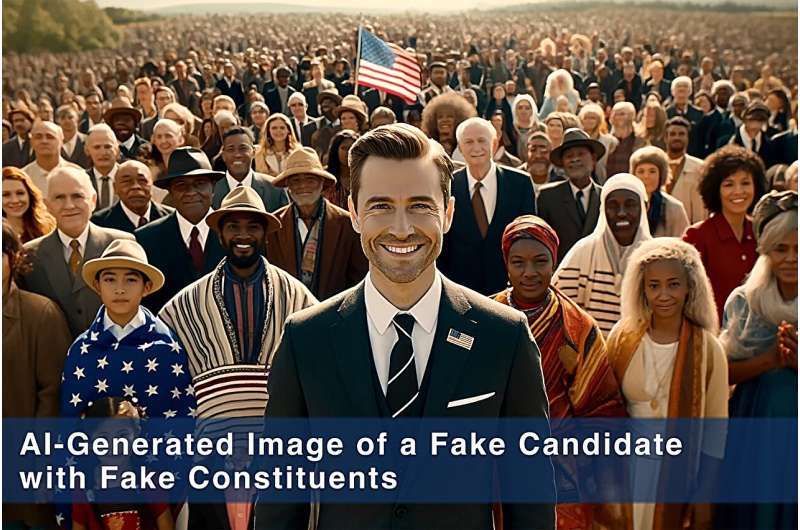This article has been reviewed according to Science X's editorial process and policies. Editors have highlighted the following attributes while ensuring the content's credibility:
fact-checked
trusted source
proofread
Americans think AI will harm privacy and elections: Report

Americans are quite worried about the role artificial intelligence will play in both politics and society, according to a new report by the Polarization Research Lab.
The lab gauged Americans' partisan attitudes, including if they thought AI would make the world better or worse for themselves and more broadly. More than 2,900 respondents were surveyed in March via the YouGov platform.
"Americans are pessimistic about the effects of AI," says Sean Westwood, an associate professor at Dartmouth and director of the Polarization Research Lab. "They are concerned about how it will affect politics and society."
Looking ahead to U.S. elections this fall, 50% of Americans think that AI will make elections less civil due to its use in political campaigns, as compared to 20% who think it will make elections better.
"Americans are worried that AI will shock the political landscape," says Westwood. "What is clear is that AI has already intruded into elections."
For example, Donald Trump supporters have been sharing images generated by AI of the former president with Black voters to create a false impression about the depth of his support among what has traditionally been a reliable voting bloc for Democrats.
The report also shows that 40% percent of Americans think that AI will make national security worse while nearly 30% think that it will make national security better.
The data also finds that 65% of Americans are worried that AI will harm personal privacy. In addition, 50% are concerned that AI may threaten their jobs by performing tasks they currently undertake.
Republicans are most concerned about the effects of AI on personal privacy, national security, and elections. While Democrats are also concerned, they are split over whether AI may make national security worse, better, or said that they don't know.
"The real threats are that individuals won't be able to discern real content from an elected official from AI-generated content or be able to separate real news from propaganda created by foreign nations," says Westwood.
During the 2016 election campaign, one of the big concerns was fake news articles posted to websites, but it is now possible to create fake videos of candidates cheaply and easily with video and audio that is indistinguishable from reality.
"AI is at a point where content can be easily created and disseminated by anyone," says Westwood. "Nefarious actors have already used AI to impersonate celebrities and politicians. Society and the law are currently several steps behind."
"There's a real need to differentiate between free speech and content that can have real material harm to someone's safety or to someone's person," says Westwood.
The new report is part of the Polarization Research Lab's monthly report series, The Path 2024, which analyzes Americans' attitudes on key issues leading up to and following the presidential election in November. The next report will focus on corporations taking stances on social issues.
More information: Report: prlpublic.s3.amazonaws.com/reports/March2024.html
Provided by Dartmouth College





















